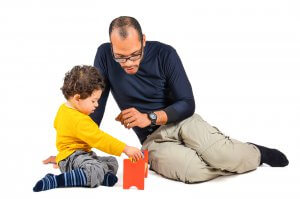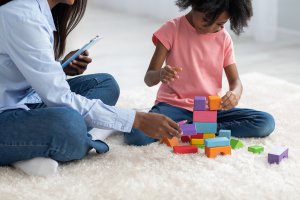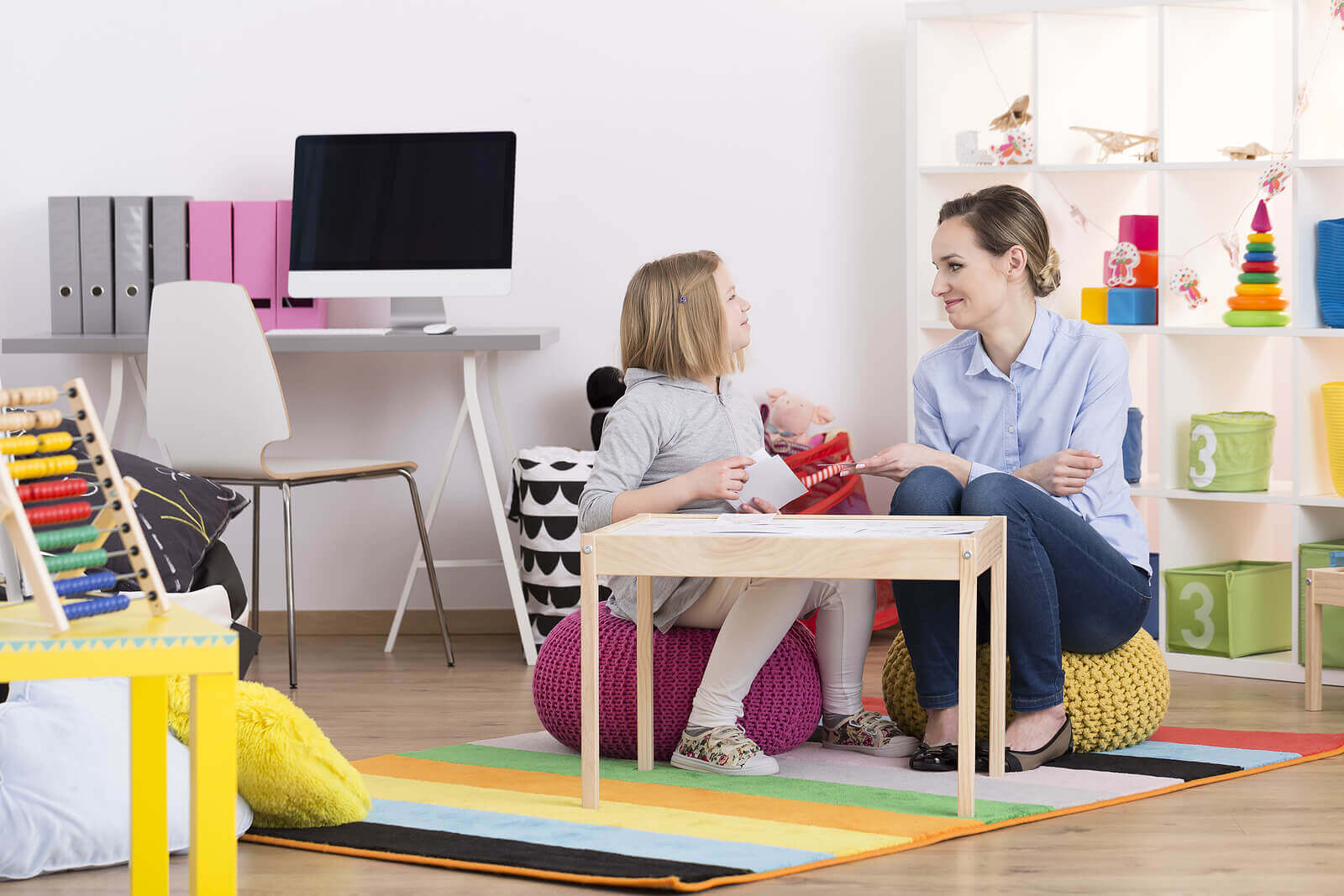Play is a powerful tool for children and adults alike.
However, academic pressures and extracurricular commitments frequently overshadow the importance of play. We live in a society that can be very focused on accomplishments. This can even seep into therapy. There can be an expectation in therapy that we fix the problem, develop coping skills to manage symptoms, and keep the topics of therapy focused on the presenting issue. This course of action can be helpful for adults.

Understanding Childhood Anxiety
Before we explore the therapeutic benefits of play, it’s essential to understand childhood anxiety. Anxiety is a natural part of life. When anxiety becomes overwhelming and persistent, though, it can greatly impact a child’s mental health. We should think of anxiety as a continuum. Healthy anxiety can motivate us to wash our hands and minimize germs. Anxiety can even be experienced as excitement. But sometimes anxiety gets in the way of everyday functioning.
Anxiety that interferes with life can happen gradually or suddenly. At the extreme end of anxiety, you might find your child regressing. Previous areas of functioning may be impacted. For example, a child who has been potty trained for years may begin to wet themselves. Or suddenly fears of being alone may derail bedtime.
Common triggers for childhood anxiety include:
- Academic stress
- Peer relationships
- Family dynamics
- Social situations
- Specific phobias
- Novel situations like the first day of school
- And a variety of other potential worries
Children may manifest anxiety through physical symptoms:
- Stomach aches
- Headaches
- Changes in sleep patterns
- Changes in eating patterns
- Tantruming & Angry Outbursts
Alternatively, emotional signs include:
- Irritability
- Anger
- Tearfulness
- Withdrawal
- Clinginess
Lastly, children may exhibit cognitive struggles including:
- Frequent worries
- Questioning
- Catastrophizing (ruminating on worst-case scenarios)
- Needing to be reassured repeatedly
When anxiety gradually increases sometimes it can be hard to notice. Therefore, recognizing these signs early on is crucial for parents to provide the necessary intervention.
The Therapeutic Power of Play

- Explore and release their feelings
- Express their concerns
- Learn and practice coping mechanisms
- Develop mastery over a scary situation
1. Emotional Expression
Play allows children to express complex emotions that they may struggle to communicate verbally. Through imaginative play, such as role-playing or using dolls/action figures, children can act out scenarios that mirror their own experiences. Thus, these figures play out the child’s internal emotional experiences. The expressed feelings may be already known by the parent and child. For example, sadness about a parent’s travel related to work. Other emotions that feel too scary to express can also be processed through play. Unsaid feelings of anger or fears the parent may not return might be revealed. This helps your child make sense of their feelings. It also provides therapists and parents with valuable insights into the child’s inner world.
2. Catharsis and Release
Play acts as a release for pent-up emotions. Engaging in physical play, such as running or engaging in sports, helps release built-up stress. This not only promotes physical health but also contributes to emotional well-being. Physical engagement can reduce stress hormones and release endorphins. This can promote feelings of relaxation and elevated mood. Tag, Keep Away and Catch Me can be the burst of energy that releases pent-up anxiety.
3. Building Resilience
Play fosters resilience. It allows children to face challenges, make decisions, and navigate social interactions in a controlled environment. Whether it’s a board game or an outdoor activity, each play experience presents a chance for children to develop problem-solving skills and learn to cope with setbacks. These structured games are great for increasing frustration tolerance, managing a new situation, and practicing social skills.
4. Practicing Coping Strategies
Ever seen a young child coaching their doll on how to manage a difficult situation? Play can be a profound opportunity to practice skills. “Dolly, you can’t play with the ball right now. You have to wait your turn.” We learn through watching others, instruction and practicing. However when we teach the skill to someone else, we can achieve a whole different level of mastery.
5. Developing Mastery
In continuation, play provides children with the opportunity to re-experience a situation. This provides opportunities that may not be available in real life. They may replay a scenario over and over. This is similar to what we, adults, do with our thoughts. They test out alternative responses and consider a variety of potential endings. As they do this, your child may develop a better understanding of the situation. In turn, they may start to talk about their experience with words. As adults, we can notice if they seem to be developing a mastery or increased ease with the situation. Or we may see kids get stuck in the same play over a long period of time.
Play to Process Childhood Anxiety
An example of this was when my own son had an anaphylactic reaction. As a result, a series of playful behaviors developed. First, he started pretending to have a reaction. (I did not initially experience this as play). However, this was playful as he would hold his neck and cough “help me”. He would stop and confirm I was paying attention. If I wasn’t, he would seek me out in the house and proceed again with his play. In response, my role was to get a trainer epi pen (one without any actual medication) and inject him. Sometimes I would have to chase him. Sometimes he would need to be injected several times until the play stopped. Eventually, we were able to talk about his concerns about the reaction AND the need to ensure we were able to help him. After a few months, the behavior decreased and disappeared.

Get Started With Child Therapy in New Jersey Today!
Play can be an important coping skill for a child with anxiety. A child therapist can help you to understand the importance of play for a child with anxiety. Our child therapists in Branchburg, NJ, and Scotch Plains, NJ understand the importance of parent involvement. To ensure that you have the parenting support you need and deserve and to begin therapy for your child, follow these steps:
- Connect with Brave Minds Psychological Services today for a free 20-minute consultation.
- Get your questions answered by one of our experienced therapists.
- Begin feeling more hopeful as a parent.
Other Counseling Services at Brave Minds Psychological Services
At Brave Minds Psychological Services, we offer a variety of services from our licensed therapists in order to get you on the right path to healing. Our other services include child sexual abuse therapy, therapy for teens, anxiety treatment for teens, and teen social phobia therapy. We also specialize in adult anxiety counseling, postpartum counseling, birth trauma therapy, sexual assault counseling for adults, food allergy therapy, online therapy, group therapy, couples counseling, and counseling for parents.
Futhermore, we also have a blog where we write about a variety of different mental health subjects. If you’re interested in learning more about us here at Brave Minds Psychological Services, please reach out at our Scotch Plains and Branchburg counseling offices!



